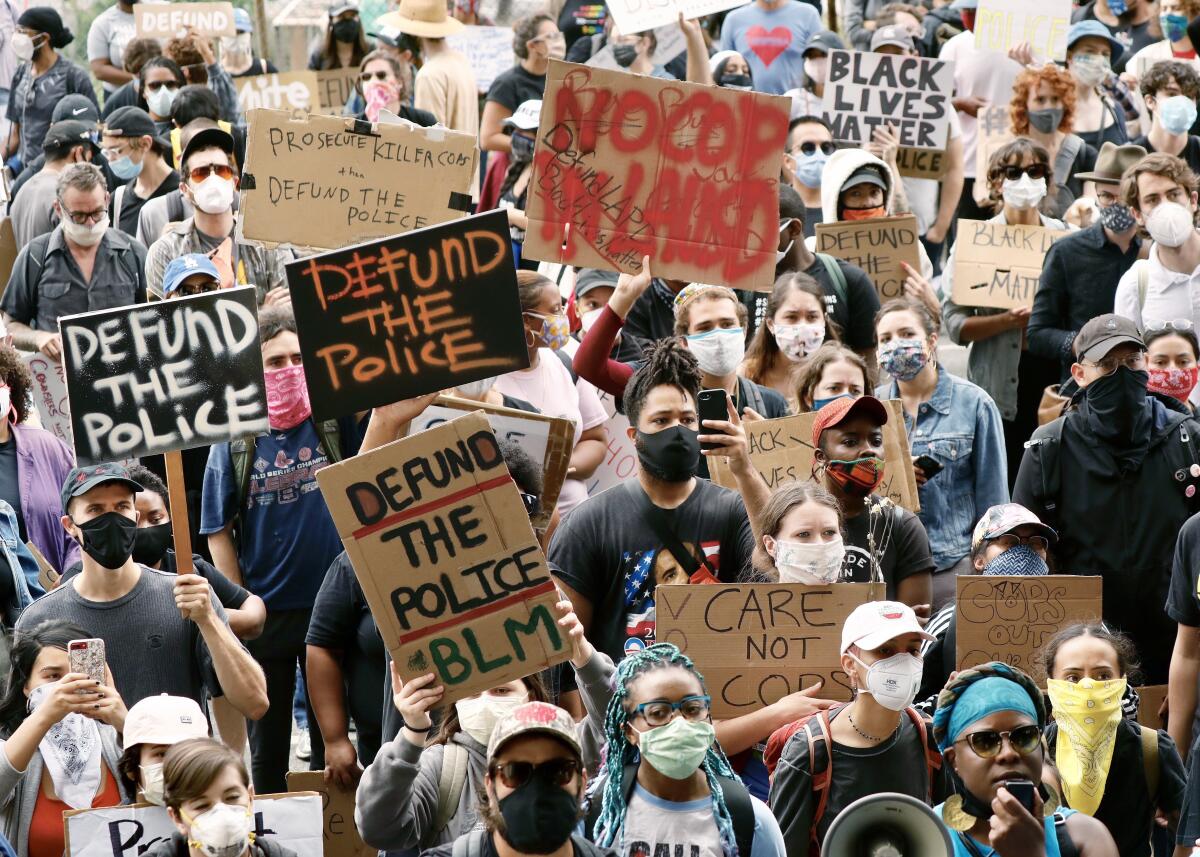Activists, students, parents rally for end to L.A. school police

- Share via
Hundreds of students, parents and community members gathered in front of a downtown L.A. high school Tuesday, calling for the elimination of the Los Angeles School Police Department, a force of about 470 officers and civilians.
The rally and march began at Miguel Contreras Learning Complex, just west of downtown, and ended at the nearby school district headquarters during an L.A. Board of Education meeting. The future of school policing,however, was not on the posted agenda of the closed-door session.
Those marching said they wanted to redirect the $70 million school police budget to mental health services, restorative justice programs, college counselors, nurses and other services that could help Black students. At district headquarters, they chanted, “Hey, LAUSD, defund the police” and “Students, not suspects.”
L.A. schools Supt. Austin Beutner said Monday he would propose banning the use of pepper spray and carotid holds — better known as chokeholds — by school police. Although the Board of Education will pass a budget this month, no members have voiced support for eliminating or defunding the school police for the coming year, and three — Jackie Goldberg, George McKenna and Nick Melvoin — have publicly said they are open to discussing school police policies and reforms.
Student speakers at the rally expressed pain and fear they experience from the school police presence and their frustration over the lack of much needed services. They also called for greater diversity among teachers.
Thandiwe Abdullah, 16, a recent graduate of the Los Angeles Center for Enriched Studies, said “I hated my school,” and criticized the administration for assigning a white instructor to teach ethnic studies, for placing her in classes with only two Black teachers from middle school through high school, and for involving school police officers who made her feel criminalized, rather than a psychiatric social worker, when she needed support.
Schools should spend the police budget on investment in curriculum that imparts more Black and Latino stories and on services for those youth, she said.
“We have never been silent about what we wanted,” she said. “We know what we want. We know what we need.”
Labor Community Strategy Center organizer Channing Martinez spoke about the years-long effort to end policing at schools, including work to stop suspensions for “willful defiance” and the ticketing of tardy students on their way to school. Organizers also successfully pressured the school system to return weapons from the federal government.
Each of those wins represents a thread of racism extracted from a large fabric of oppression in Los Angeles Unified, Martinez said. “Might as well just burn the fabric.”
Brianna Parnell, a 2019 Gardena High School graduate, told those assembled that, when she was 7 years old, police killed her father and more recently her 18-year-old cousin. Demonstrators chanted each of their names in response.
At school, Parnell said, she saw Black students targeted for minor offenses like talking back.
“Do you think the dean believed the Black girl with the box braids and the pink backpack or the terrified teacher” with too many students in her classroom? Parnell asked.
Cecily Myart-Cruz, a Black Lives L.A. member and president-elect of United Teachers Los Angeles, which represents the district’s teachers, nurses, librarians and counselors, spoke on the steps of L.A. Unified headquarters.
“Let our imaginations fly in police-free zones,” she said, “where our students do more than survive — they thrive.”
Members of a union that represents district classified employees, SEIU 99, also participated in the march. In an email statement, SEIU 99 president Max Arias said the union does not support eliminating the school police department. Instead, it supports “no guns, no handcuffs, no pepper spray on our children” as well as “more investment in education, counseling, parent engagement, after school programs.”
L.A. School Police Association President Gil Gamez has said officers are necessary to keep the peace on campus and are trained to deescalate situations among students. His and five other unions released a joint letter Monday asking the school board to keep the police department intact.
On Sunday, L.A. Unified spokeswoman Shannon Haber said school police used pepper spray on at least five students during the 2018 calendar year, at least seven in 2019 and at least one thus far in 2020.
On Tuesday she said that in 2019, school police pepper spray impacted a total of seven students at six different schools. The 2020 incident involved one student at one school, she said. Youth advocates say the numbers of students affected are an undercount.
Haber would not say where or when the 2019 incidents happened or why police pepper sprayed students. The district has not provided The Times with police documentation or incident reports related to pepper spray or other school police weapon use.
During the school board meeting, three parent activists spoke in support of school police.
“The system isn’t perfect and needs to be changed, but leaving campus exposed without an officer” would be the wrong course of action, said Ofelia Sofia Ryan, a member of the group Padres Unidos.
Having to rely on city police would be worse, she added: “School police is a better option because you can decide what training they need and what protocol to follow in working with students.”
Maria Parra said she had seen campus police work as mentors to students, helping them turn their lives around and become successful.
More to Read
Sign up for Essential California
The most important California stories and recommendations in your inbox every morning.
You may occasionally receive promotional content from the Los Angeles Times.















